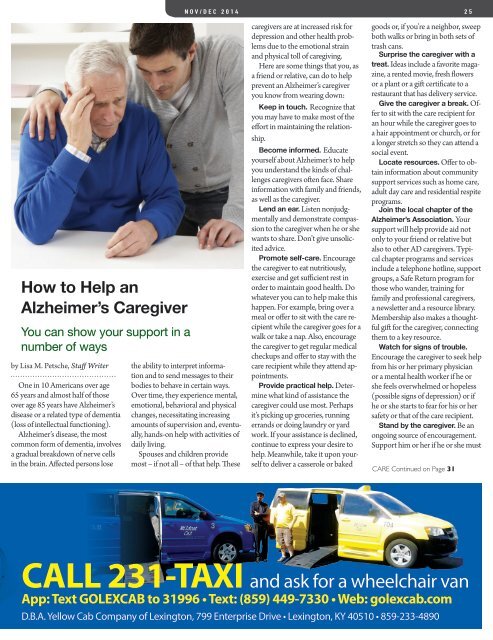Living Well 60+ November – December 2014
Create successful ePaper yourself
Turn your PDF publications into a flip-book with our unique Google optimized e-Paper software.
How to Help an<br />
Alzheimer’s Caregiver<br />
You can show your support in a<br />
number of ways<br />
by Lisa M. Petsche, Staff Writer<br />
One in 10 Americans over age<br />
65 years and almost half of those<br />
over age 85 years have Alzheimer’s<br />
disease or a related type of dementia<br />
(loss of intellectual functioning).<br />
Alzheimer’s disease, the most<br />
common form of dementia, involves<br />
a gradual breakdown of nerve cells<br />
in the brain. Affected persons lose<br />
NOV/DEC 2 0 1 4<br />
the ability to interpret information<br />
and to send messages to their<br />
bodies to behave in certain ways.<br />
Over time, they experience mental,<br />
emotional, behavioral and physical<br />
changes, necessitating increasing<br />
amounts of supervision and, eventually,<br />
hands-on help with activities of<br />
daily living.<br />
Spouses and children provide<br />
most <strong>–</strong> if not all <strong>–</strong> of that help. These<br />
caregivers are at increased risk for<br />
depression and other health problems<br />
due to the emotional strain<br />
and physical toll of caregiving.<br />
Here are some things that you, as<br />
a friend or relative, can do to help<br />
prevent an Alzheimer’s caregiver<br />
you know from wearing down:<br />
Keep in touch. Recognize that<br />
you may have to make most of the<br />
effort in maintaining the relationship.<br />
Become informed. Educate<br />
yourself about Alzheimer’s to help<br />
you understand the kinds of challenges<br />
caregivers often face. Share<br />
information with family and friends,<br />
as well as the caregiver.<br />
Lend an ear. Listen nonjudgmentally<br />
and demonstrate compassion<br />
to the caregiver when he or she<br />
wants to share. Don’t give unsolicited<br />
advice.<br />
Promote self-care. Encourage<br />
the caregiver to eat nutritiously,<br />
exercise and get sufficient rest in<br />
order to maintain good health. Do<br />
whatever you can to help make this<br />
happen. For example, bring over a<br />
meal or offer to sit with the care recipient<br />
while the caregiver goes for a<br />
walk or take a nap. Also, encourage<br />
the caregiver to get regular medical<br />
checkups and offer to stay with the<br />
care recipient while they attend appointments.<br />
Provide practical help. Determine<br />
what kind of assistance the<br />
caregiver could use most. Perhaps<br />
it’s picking up groceries, running<br />
errands or doing laundry or yard<br />
work. If your assistance is declined,<br />
continue to express your desire to<br />
help. Meanwhile, take it upon yourself<br />
to deliver a casserole or baked<br />
2 5<br />
goods or, if you’re a neighbor, sweep<br />
both walks or bring in both sets of<br />
trash cans.<br />
Surprise the caregiver with a<br />
treat. Ideas include a favorite magazine,<br />
a rented movie, fresh flowers<br />
or a plant or a gift certificate to a<br />
restaurant that has delivery service.<br />
Give the caregiver a break. Offer<br />
to sit with the care recipient for<br />
an hour while the caregiver goes to<br />
a hair appointment or church, or for<br />
a longer stretch so they can attend a<br />
social event.<br />
Locate resources. Offer to obtain<br />
information about community<br />
support services such as home care,<br />
adult day care and residential respite<br />
programs.<br />
Join the local chapter of the<br />
Alzheimer’s Association. Your<br />
support will help provide aid not<br />
only to your friend or relative but<br />
also to other AD caregivers. Typical<br />
chapter programs and services<br />
include a telephone hotline, support<br />
groups, a Safe Return program for<br />
those who wander, training for<br />
family and professional caregivers,<br />
a newsletter and a resource library.<br />
Membership also makes a thoughtful<br />
gift for the caregiver, connecting<br />
them to a key resource.<br />
Watch for signs of trouble.<br />
Encourage the caregiver to seek help<br />
from his or her primary physician<br />
or a mental health worker if he or<br />
she feels overwhelmed or hopeless<br />
(possible signs of depression) or if<br />
he or she starts to fear for his or her<br />
safety or that of the care recipient.<br />
Stand by the caregiver. Be an<br />
ongoing source of encouragement.<br />
Support him or her if he or she must<br />
CARE Continued on Page 31<br />
CALL 231-TAXI and ask for a wheelchair van<br />
App: Text GOLEXCAB to 31996 • Text: (859) 449-7330 • Web: golexcab.com<br />
D.B.A. Yellow Cab Company of Lexington, 799 Enterprise Drive • Lexington, KY 40510 • 859-233-4890
















